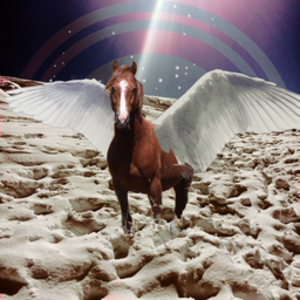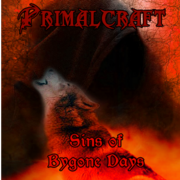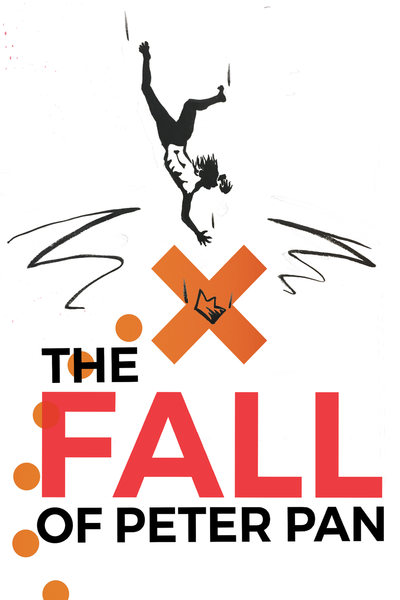It was a quiet day upon the Neverland sea. The JOLLY ROGER wallowed at its berth, and Hook was reading a much-thumbed book on medieval torture on the quarterdeck. Professor Basil Rathbone, his notebooks, albatross quill and squid ink returned to him, was industriously reviewing and making notes from a deckchair nearby.
“Excuse me, Captain,” he broke the silence.
“Hm-mm?”
“Do you happen to have a magnifying glass?”
“No,” returned Hook, turning a page.
“I’ll just check. You may have overlooked it, you know,” said Rathbone as he clattered down the steps to Hook’s cabin, “just like that volume on epistemology.”
Hook frowned a little at this. He was very sure he’d never purchased nor seized the book in question, and that it had not existed on his shelves until the eccentric professor had expressed a desire to read it.
Professor Basil Rathbone came back up the stairs, brandishing a magnifying glass. “I knew I could rely upon your magpie habits,” he said cheerfully.
“I have never seen that instrument in my life,” Hook said flatly. He did vaguely recall having owned one when he was a child; he had incinerated ants with it, on rare sunny days. But that one had been smashed by a schoolyard bully. He remembered crying bitterly in the mossy corner by the old church at its loss.
“Well, it was on top of your writing desk,” Rathbone said placidly, “Exactly where I thought it would be.” Resuming his studies, he bent closer to the page, the glass illuminating an engraving to his satisfaction.
Distracted from his book, Hook stared across the restless bay to the benighted island. Even at half a mile distant, the sound of the wind scratching in the leaves like blades put his teeth on edge. The shadows were deep, dangerous, and full of claws and knives. It was a dank, dark place.
The reasonless changes in landscape sent him cold, despite the wet clinging of the tepid air. Mountains that existed, then didn’t. Trees which changed their very species in the blink of an eye, chameleonic. The shark-like mermaids, pestilential will o’ the wisps, hex-hurling pixies and the crocodile. Every step taken on that island was tripped up, every pond loathsome and malarial, every plant poisonous or barbed. Land was the enemy; the only refuge the pirates had was on board the JOLLY ROGER. Even now, some of them fished off the lower deck with a lacklustre energy, whilst others played at dice or knife-toss. None of them, not a one, looked to the shore for distraction.
It was too dangerous.
And yet: every few days, sometimes every day for a fortnight, they would feel compelled to roam the island, screaming in rage at the Fear which settled on their shoulders, singing songs to encourage each other. They tripped and staggered about the island; Hook refused to set foot upon it unless absolutely necessary, riding in state upon his man-powered chariot.
Hook tasted bitterness in his mouth, and downed a mouthful of some nameless liquor.
“You look pensive,” his new comrade observed mildly.
Hook’s first reaction was rage, but he restrained himself, hearing no criticism or jeering in Rathbone’s voice. “It is nothing,” he managed.
“Then might I distract you with some questions about yonder island?”
“Speak forth.”
With the air of an examiner settling to a loved task, Basil straightened in his deckchair (again, Hook was certain the JOLLY ROGER stocked no deckchairs, and was made helpless by the proof).
“As a naval man, I trust you have established an approximate longitude and latitude for our location?”
“You mistrust.”
“Could you not make some guess? The species of flora and fauna inhabiting the island? The ethnicity of its native inhabitants?”
Hook twisted his moustaches with irritation. “Tiger hunts with lion, amongst pines, ferns and orchids. Sometimes it snows, and a day later we are stricken prone with the heat. There are no native inhabitants; the tribe arrived after we did, and identify themselves as some variety of Indian. Goblins and tricksy elves inhabit the dark places, and mermaids certain coves.”
Professor Basil Rathbone gave him a doubtful, slightly concerned glance from beneath his brows. “Perhaps you mean dugongs, or sea cows? They are reputed to exist as a basis of many mermaid myths.”
“I mean mermaids.”
“Or potentially a species of small whale, like a beluga, whose pale rounded forehead might be mistaken for that of a sea maiden to sailors a little, ahem, long between ports?”
“Mermaids, damn your eyes! Nubile women with fish tails!”
Rathbone sat back, apparently dumbfounded. Hook relaxed, closing his eyes in the peaceful silence.
“May I visit and speak to them then?”
“What?”
The professor sat upright, hands folded neatly over his books. His tanned fingers with their neatly trimmed nails seemed poised for action, torn betwixt grasping for a pen and waving in the air. He was wearing one of Hook’s old shirts, and his wrists showed from beneath the long, ballooning sleeves with the ragged ends, shorn of valuable lace.
“You have informed me that there are mermaids here, of the kind renowned in song and story. I must assume that they are distant cousins of homo sapiens, similar to the great apes, and therefore intelligent to some degree or other.”
Hook sputtered at this blasphemy, but Professor Basil Rathbone waved him silent with an imperious gesture. Much to his own surprise, Hook settled himself to listen silently.
“I don’t care how long you have been stuck in this remote backwater, Captain, but I will not countenance ignorance. You will educate yourself to an understanding of the current scientific theories, whether or not I have to read every page aloud to you.” He stood, suddenly be-robed in the mantle of his learning, and stern in disapproval. “You will find Darwin’s Evolution of the Species in your bookshelf below decks, on the lowest shelf, furthest to the right, and I expect you to be started on it by the time I return. It will be an enlightening introduction to the subject.”
Captain Hook, defiler of virtue, murderer and rapine pillager, hunched his shoulders a little, and nodded in obedience. The discipline of his childhood in the private schools, presented before similar lofty professors, came back and cowed him completely.
“Meanwhile, I shall require directions to this cove the mermaids inhabit, and the use of one of your dinghies for the afternoon, possibly the night.”
With a barked command, Gentleman Starkey flung the men into action, both food and a small dinghy being prepared with lightning speed. Meanwhile, Captain Hook disappeared below, closing the door to his quarters with not quite a bang. Professor Basil Rathbone stood abstracted in thought until the little vessel was quite ready for him, after which time he thanked the sailors politely, climbed down and in, unshipped the oars and commenced to row.
Clockwise around the island he went, admiring its scenery as he did, and keeping a wary eye out for potential shoals. Soon enough, he reached a long depression in the island, the stern rock leading into a green and cool lagoon, from whence laughter issued, with the occasional sparkling bubble.
If you shut your eyes and are lucky, you may see at times a shapeless pool of lovely pale colours suspended in the darkness; then if you squeeze your eyes tighter, the pool begins to take shape, and the colours become so vivid that with another squeeze they must go on fire. But just before they go on fire you see the lagoon. This is the nearest you ever get to it in the adult world: that one heavenly moment. On Neverland, you can swim in its very waters.
The depth of the water began to undulate with outcrops of corals both pale and flaming in colour. The lapping of waves against the rocks was a soporific, despite the sound of splashing which Rathbone could hear from further inside the bay, around a large curving rib of stone, capped with grasses and a small, hardy tree.
“It is a promising place,” murmured Professor Basil Rathbone to himself, feeling excitement war with years of logic. “If they should be there, those ficklest of fairy kind.”
At the first splash of the oar against the water inside of the cove proper, the trilling calls and merry laughter was extinguished, and Rathbone rowed into the wide basin of the Mermaids’ Cove to find the bay abandoned to the birds and crabs.
Undeterred, he fetched the little craft up against Marooners’ Rock, clambered nimbly out, and arranged himself upon a borrowed wad of sailcloth – it would not do to be uncomfortable – with a small basket of provender.
Reaching into his pocket, he removed the aforementioned notebook. It was crabbed with small writing, and very thick, for it had been his only companion and confidante for many months.
Clearing his throat, he announced to the empty cove, “In honour of the inhabitants of this lovely bay, I shall commence with Shakespeare.”
Was there the faintest of giggles, echoing and watery, from beneath the waves?
He began:
“Ariel says – Full fathom five thy father lies;
Of his bones are coral made;
Those are pearls that were his eyes:
Nothing of him that doth fade
But doth suffer a sea-change,” here his voice broke a little, and the salt water ran from his eyes, remembering his dear friend and faithful assistant, Nicholas Bartolone, whom he had let sink in a sea burial upon his death, and all the lonely days which had followed up until he reached Neverland’s shores.
He cleared his throat and continued: “Into something rich and strange.
Sea-nymphs hourly ring his knell
Burthen ding-dong
Hark! Now I hear them, —Ding-dong, bell. That was for Nicholas, who died. You might have met him floating down below. He was a beautiful lad, with a genuine heart and the courage of a lion. Only at the end was he scared, and then… I think I failed to comfort him enough.” He sat for a little while, head lowered and eyes lower still. It seemed that he could hear a faint ringing, as of bells beneath the waves, as some of the mermaids left their houses of coral to listen to him declaim poetry for them.
With a broken laugh, he continued. “O, train me not, sweet mermaid, with thy note,
To drown me in thy sister’s flood of tears…”
Each line drew from deep within his heart the red-hot strands of memory and heartbreak. Had he been wrong to love as he did? Rathbone had not chosen it, and would have tried harder than anything to prevent his actions from harming those who cared for him, and whom he loved. On good days, it had seemed like they could go on forever, a circle made up of the four of them: himself, Jasper, young Nicholas and Samantha, a family of kindred spirits, peaceful and happy.
But the fragile house of cards and carefree days had fallen down amongst each other, in a welter of public outrage and punishing ostracism. In the aftermath of the hurricane, Professor Hawkins and his (their) daughter, Samantha, had left for the Americas, never to return. Hawkins’ marriage had broken asunder. Rathbone was pointedly instructed to take a years’ sabbatical, traveling abroad, and invited not to come back. Only his assistant, Nicholas, had stood by him, defending his reputation fiercely, at the cost of his own prospects. Rathbone knew well how that series of misfortunes had ended: in shipwreck and tragedy.
As his mind had wandered, so had the sources of his poetry – now he recited Tennyson, skipping from stanza to stanza.
“…from under my starry sea-bud crown,” he paused, and, drawing breath, glanced up.
A copper-haired sea-maid had her elbows resting upon the edge of the rock, watching him lettuce-green eyes, filled with colour from edge through to edge.
“What is a sea-bud?” she asked.
“I would surmise the poet may have meant sea anemones,” Rathbone said, “As they look a little like flowers, of which might be formed a garland and placed in the hair.”
“That is a silly idea, they are rooted to rocks. He was a stupid man.”
“But a very good poet,” Rathbone intervened, to which she attested with a sideways dip of her head.
“Read me some more,” she demanded.
So he recited to her Rackham and De La Mare, and more came to listen to him speaking. Mermaids are hedonistic, narcissistic creatures, and not without their faults, but sweet songs and poesy are ever-effective lures. This was something that Hook, with his bluster, did not know, and Peter, with his mastery of the island, did not require.
One of them asked, “Why are you so sad, man?” She had eyes of depthless blue, her scales midnight and silver. Her teeth were sharp. He mentally named her Midnight Blue.
Rathbone took a breath. “Because I was foolish, and my actions resulted in harm to other people.”
She gave him a long, hard look, slithering up onto the rock. “Did they agree to your actions, with awareness of the consequences?” Her curling tail had the look of a lever, wound up and poised to spring or strike.
“Some did not. But I was in love!” The plaintive cry echoed around the cove, and there was a susurrus of sighs.
Another member of the siren jury demanded of him, “Was the cost worth your love?”
They all pressed close about the rock, a rainbow of eyes and colours, waiting to pass judgment, and either drown or absolve him. A relationship broken, three careers ruined, four reputations in tatters, exile and death… and love. Love deep and wild and sweet enough to last a lifetime. Or so it had seemed.
The long, tense moment stretched out, snapped, and he sprang to his feet, as though to throw himself at them. “It was!” Rathbone cried, his voice raw, “So help me, it was!”
He collapsed to his knees and wailed brokenly, sobbing until his throat was hoarse, until his eyes were red and there was nothing left to cry out.
The mermaids had left him alone in the cove, and returned to their homes beneath the surface, to play with baubles until the crying stopped. They were not empathic enough to accept the burden of another’s grief, but even so, the brief exchange and confession had salved his guilt a little.
As he drank a little boiled water from the leather flask, a head broke the surface.
It was Midnight Blue, the dark-coloured one. “What is his name?” she asked, without preamble.
“Jasper Ambrose Hawkins,” Rathbone confessed, feeling the familiar surge of nervousness when he spoke the name.
“You may come and speak to us again, human.”
Copper Hair, with the sea-green eyes, rose to the air. “Bring us apples when you come next,” she said.
Professor Basil Rathbone bowed solemnly to them. “I shall endeavour to bring you apples. I’m sure the JOLLY ROGER will have some on board.”
Both mermaids drifted away slightly, recoiling at the name. “You would do well to leave that company,” said Midnight Blue darkly. With a turn of their scaled flanks, they were gone.











Comments (0)
See all